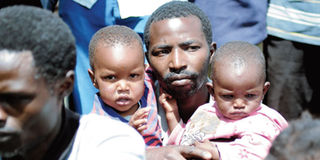Include Kibaki, Raila in trial Bensouda told

IDPs at Pipeline camp in Nakuru listen to ICC prosecutor Fatou Bensouda during her visit on October 25, 2012 where she promised to incorporate the evidence she got during her tour in the Kenyan Case at The Hague. Photo/SULEIMAN MBATIAH
What you need to know:
- Prosecutor says her office depended on evidence produced to get suspects and not allegations or perceptions
Some Internally Displaced Persons want President Kibaki and Prime Minister Raila Odinga included on the list of suspects to be tried at The Hague. Read (Trials not political, Bensouda tells Nakuru IDPs)
They told the International Criminal Court Chief Prosecutor, Ms Fatou Bensouda, when she toured Pipeline IDP camp in Nakuru, that the fight over votes was between the two and that they should have been the first to be prosecuted.
“When the two bulls fought, we suffered, they were the generals in the fight and they caused our displacement,” said Mr Paul Thiong’o the camp chairman.
He also asked the prosecutor to include IDPs on her list of witnesses in the Kenyan case at the Hague since they were the victims who witnessed the chaos and have the truth about the violence that left hundreds dead and over 350,000 families displaced.
Mr Thiong’o said IDPs were saddened by the ICC’s failure to visit them during investigations into the 2007/08 post-election-violence.
“Who are the ICC witnesses if none of us is, who knows the story better than us yet none of us has been called to give evidence at The Hague?” He wondered.
He accused the court of opening old wounds by visiting them now when they had started healing and the government was almost completing their resettlement.
“You should have visited us when we were hurting, that is the time we needed you most, we wanted to tell you our stories but your predecessor came to Kenya, talked to senior people, visited the park and left us un-attended,” said Mr Thiong’o.
Ms Bensouda who was accompanied by the ICC director of Jurisdiction, Complementary and Cooperation Division, Mr Phakiso Mochochoko, is in Kenya on a fact finding mission.
She was scheduled to visit several camps in Rift Valley and Kiambaa Kenya Assembles Gospel Church where people were burnt alive during the violence, but she only managed to visit Pipeline camp due to unknown reasons.
Ms Bensouda immediately went back to Nairobi where she was to address the press later in the day.
At the camp, Mr Thiong’os sentiments were echoed by Ms Beth Wanjiru who said those culpable for the violence were walking free while intimidating victims.
“I cannot go back to Makongeni where I was forcefully evicted during the violence because those who attacked me are roaming the village,” she told Ms Bensouda.
Another speaker, Mr Rodgers Mwai, observed that ICC was concentrating more on the suspects while ignoring the victims of the violence.
He added that Narok and Kericho, which were also hard hit by the violence were not being taken care off because investigations were poorly done.
Ms Wanjiru said, the middle-level commanders and the actual perpetrators of the violence should be arrested to help with the apprehension and prosecution of the war commanders and financiers.
The prosecutor who was responding to speakers promised to incorporate the evidence being collected from IDPs in the case.
She apologised on her behalf and that of her predecessor, Mr Moreno Ocampo for failing to visit the displaced families earlier.
On president Kibaki’s and PM Raila’s arraignment at The Hague, Ms Bensouda said her office depended on evidence produced and not mere allegations and perceptions.




